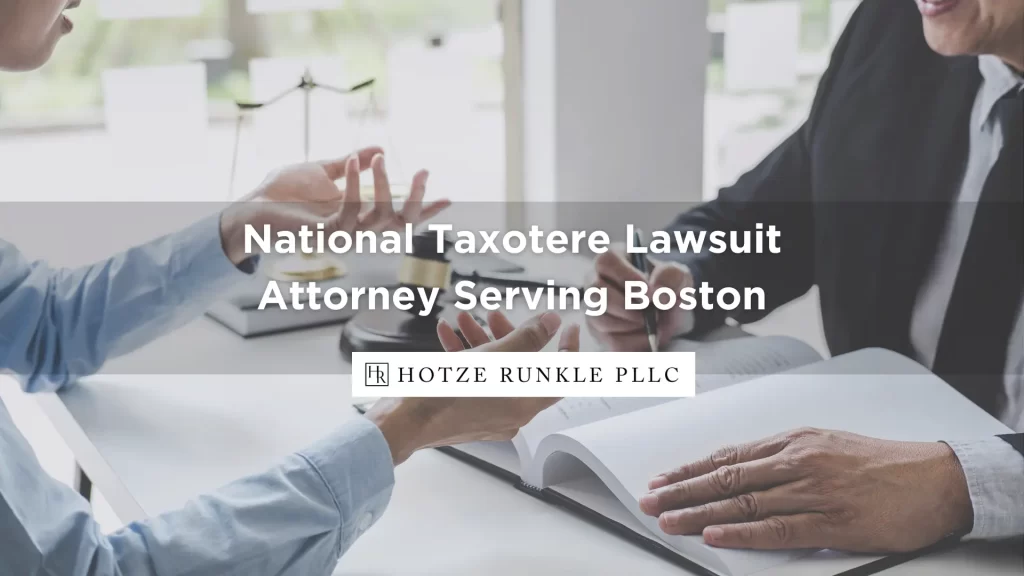
Taxotere is a chemotherapy drug that treats various cancers, including breast cancer and cancer of the lungs, head, neck, and stomach. Unfortunately, Taxotere is also linked to a dangerous eye condition canalicular stenosis. Symptoms of canalicular stenosis include excessive eye-watering and blurry vision.
Canalicular stenosis can be debilitating and affect your qualify of life. You shouldn’t have to suffer alone due to another party’s negligence. If you’ve developed canalicular stenosis, or experienced another dangerous side effect of Taxotere, Hotze Runkle PLLC may be able to help you pursue financial compensation from the pharmaceutical company Sanofi-Aventis for their involvement in manufacturing a harmful drug.
The Boston Taxotere attorneys at Hotze Runkle PLLC have the knowledge, experience, and resources to hold Sanofi-Aventis accountable, and we’ll be by your side through every step of your case. Take our Taxotere Quiz today to see if you might be eligible for compensation.
The Development of Canalicular Stenosis
Some patients first discover symptoms of canalicular stenosis while they’re still treating their cancer with Taxotere, though it may appear following Taxotere treatment, as well. Eye-watering is a common initial symptom.
When eye structures function correctly, tears funnel into the nasal cavity through canaliculi, vital structures in the ocular cavity. Taxotere may cause the canaliculi to become inflamed. Chronic inflammation can lead to infection, which may turn into a blockage in the canaliculi that prevents tears from flowing as usual.
If you don’t seek medical treatment once you notice the first symptoms, your condition could worsen. If the canaliculi close, your tears won’t funnel into the nasal cavity and will build up on the surface of your eyes. When they can’t drain properly, they will flow from the eyes, as if you’re crying.
Canalicular stenosis is an irreversible condition. There’s no cure, but you could manage the unfavorable symptoms. The most common symptoms cancer patients experience includes:
- Eye-watering
- Sensitivity to light
- Blurred or clouded vision
- Central vision loss
- Swollen eyelids
- Eye infections
- Headaches
- Dry eyes
The symptoms you experience could be minor or severe. Some patients can work and complete daily tasks, while others need to rely on someone to assist them. It can significantly diminish a person’s quality of life and prevent them from enjoying the activities they performed before the diagnosis.
How Does Using Taxotere Cause Watery Eyes?
Sanofi-Aventis created Taxotere to treat different types of cancer. It works by attacking cancer cells, shrinking them, and preventing them from spreading to other parts of the body. The doctor could administer the chemo drug on a regimen of once a week, once every two weeks, or once every three weeks.
During studies performed by medical researchers, there was evidence of a link between Taxotere secretions and a person’s tears. While tears travel from the tear ducts through the canaliculus, they interact with the drug, and inflammation occurs. Chronic inflammation can develop into canalicular stenosis symptoms over time if there’s no medical intervention.
Is Canalicular Stenosis Curable?
You should go to an ophthalmologist once you notice eye-watering or other symptoms of canalicular stenosis. If it’s early enough in its development, your doctor could stop it from getting worse. You could continue chemotherapy as long as you let your oncologist know about your condition. They will monitor your health and try to prevent further damage to the canaliculus.
Once canalicular stenosis develops, it’s impossible to cure. It’s a permanent condition you will have to live with every day. There’s a procedure you can undergo to manage your symptoms, but it’s expensive and invasive. During DCR, dacryocystorhinostomy, the surgeon will drill a hole in adjacent bones to create a passageway for your tears. The tears will bypass the damaged canaliculus and funnel into your nasal cavity like they’re supposed to. Some patients will need a stent positioned over the damaged canaliculus to help with the drainage of tears.
The structures in the eye area are sensitive, and this type of surgery is risky. You could aggravate your symptoms or develop new ones. The dangers of DCR include:
- Migrated or displaced stent
- Infections of the eye
- Blindness
- Hemorrhaging
- Sinusitis
- Facial scarring
- Tissue damage
If your canaliculus becomes severely damaged and it’s impossible to perform DCR, you might require CDCR. During conjunctivodacryocystorhinostomy, a small glass tube called a Jones tube gets placed over the canaliculus so tears can flow through as usual. Patients only need this surgery if one or both canaliculus closes, and there are no eye structures available to aid in the movement of tears.
You Deserve to Hold Sanofi-Aventis Liable for Your Side Effects
Breast cancer survivors throughout the country filed lawsuits against Sanofi-Aventis for the symptoms Taxotere caused. No one knew about the dangers of the chemo drug and that a permanent medical condition could develop. If you want to hold them accountable for their negligence, it’s your right to do so. You deserve to seek a monetary award for the suffering you experienced.
Filing a lawsuit can seem like a daunting task. Pharmaceutical companies use expensive lawyers to fight for them. They could try to intimidate you into dropping your case or delay the process, so you’re willing to settle for less than you deserve. Don’t let them take advantage of you. Our Taxotere canalicular stenosis lawsuit attorneys will protect your rights and ensure you receive the maximum compensation available.
It’s your right to sue Sanofi-Aventis for withholding crucial information about the safety hazards that come with taking Taxotere. They disregarded their consumers’ well-being and should be held accountable for the consequences of their actions.
If your doctor administered Taxotere during your chemo treatment and you ended up with canalicular stenosis or another debilitating condition, you may be entitled to file a lawsuit. Companies like Sanofi-Aventis shouldn’t get away with selling a drug that could hurt people. Hotze Runkle PLLC will fight hard for you and help you get back on your feet.
We Don’t Collect a Fee Unless You Win
 We understand the stress you’re under. After beating cancer, you should be able to enjoy your life again, but instead, you have another battle ahead of you. If you try to handle your lawsuit alone, you likely won’t get the compensation you need. Seeking legal representation is crucial to ensure you receive the maximum financial award possible.
We understand the stress you’re under. After beating cancer, you should be able to enjoy your life again, but instead, you have another battle ahead of you. If you try to handle your lawsuit alone, you likely won’t get the compensation you need. Seeking legal representation is crucial to ensure you receive the maximum financial award possible.
Anyone who’s unfamiliar with the legal process won’t know what their rights are or how to handle the steps of a lawsuit. Sanofi-Aventis’ defense attorneys could take advantage of you and use intimidation tactics that cause you to back down and drop the case. Hotze Runkle PLLC won’t let that happen.
We won’t add any additional burden to your life by charging upfront fees or costs. We take cases on contingency, which means we won’t collect any legal fees unless we recover compensation for you. If we don’t win your case, you won’t have to pay us anything.
Negligence, Liability, and Damages
There are two categories of damages you can claim for compensation when filing a lawsuit. Economic damages are actual expenses, and non-economic damages are intangible losses. If you decide to sue Sanofi-Aventis, you could attempt to recover the following damages:
- Medical costs
- Pain and suffering
- Lost wages
- Loss of future earnings
- Emotional trauma
- Physical impairment or disability
To prove to a jury that Sanofi-Aventis was negligent, you’ll need to base your case on one of the following theories:
- Design defect: The drug had a flaw in its design that prevented it from performing as intended.
- Manufacturing defect: The drug didn’t leave the manufacturer in the normal condition, resulting in harm to the consumer.
- Failure to warn: The manufacturer didn’t provide adequate warning of its drug’s safety risks.
Negligence is the legal theory that a party is supposed to take proper care during a specific action to prevent injury to another. The five basic elements of negligence include:
- Duty: The defendant owed the plaintiff a reasonable duty of care;
- Breach of duty: The defendant breached their duty;
- Cause in fact: The actions of the defendant were the direct cause of the plaintiff’s injury;
- Proximate cause: The defendant should have known their actions could result in an injury; and
- Damages: The plaintiff sustained an injury and incurred damages.
A jury can easily calculate your economic damages by reviewing your medical bills to determine an appropriate compensation amount. However, non-economic damages don’t come with billing statements and invoices. It’s difficult to decide how much money the injured victim deserves for their non-economic damages. The jury might use the factors below to come up with a fair financial award:
- The nature and extent of the injury
- Physical and mental trauma associated with the injury
- Duration of necessary medical care
- Impairment, disfigurement, or disability that resulted from the injury
- If future treatment is required
- Impact of the injury on daily activities
- Total economic damages
Contact Hotze Runkle PLLC
Our Boston Taxotere lawsuit attorneys want to help you win the compensation you deserve for your damages. You suffered enough, and we’ll aim to relieve your financial burden as much as possible. Our free consultations allow clients to meet with us and discuss the details of their case. If you need legal advice, we’ll be happy to speak with you.
We care about each client we work with. You can depend on us to help you get through this devastating period in your life. We’ll be there to provide emotional support and quality legal representation. We’ll advocate for your rights and work hard to help you get on the road to recovery.
If you’re experiencing canalicular stenosis symptoms after Taxotere treatment and want to find out if you qualify for a lawsuit, take our Quiz today.